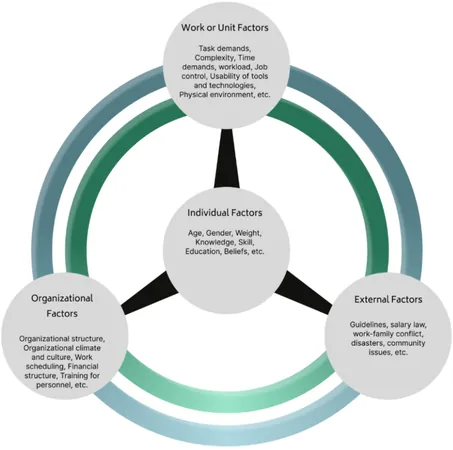
Unmasking the Mental Health Crisis: Urgent Insights into Healthcare Workers' Struggles
2025-04-29
Author: Arjun
The Hidden Crisis Among Healthcare Workers
Mental health issues have reached alarming levels among healthcare workers (HCWs) due to demanding and complex work conditions. A recent umbrella review sheds light on the prevalence of depression and anxiety within this group, highlighting risk factors that contribute to these mental health challenges in various workplace contexts.
Methodology: A Comprehensive Review
This study utilized a scoping approach to analyze existing meta-analyses focusing on depression and anxiety among HCWs, exclusively including studies published up to January 2024. Through a meticulous five-step process, a total of 61 studies were selected, revealing critical insights into HCWs' mental health.
Shocking Statistics: A Deep Dive into Prevalence Rates
Findings reveal that the prevalence of depression among healthcare workers ranges from 20.5% to a staggering 46.2%, while anxiety rates are equally concerning, fluctuating between 21.9% and 47%. Most studies originate from the Covid-19 era, highlighting the pandemic's profound impact on the mental well-being of HCWs.
Understanding the Risk Factors: A Systematic Framework
The identified risk factors are categorized into four systemic levels: individual factors, work and unit factors, organizational factors, and external factors. Individual factors include gender, age, marital status, and medical conditions, while workplace issues highlight exposure to high-risk environments and excessive workloads.
Organizational Pressures and External Influences
Organizational dynamics—like support structures and training—significantly influence HCWs' mental health. External factors, such as social stigma and family relationships, further exacerbate the situation.
The Urgency for Action: A Call for Systemic Approaches
As the research emphasizes the profound connection between mental health and work conditions, there is a pressing need for future studies to systematically explore and address these risk factors. A comprehensive approach may provide crucial insights for mental health interventions in the healthcare sector.
Economic Consequences: The Wider Implications of Mental Health Issues
It’s estimated that mental health conditions like depression and anxiety cost the global economy a staggering one trillion dollars each year due to decreased productivity. In the UK alone, mental health issues accounted for 51% of work-related illnesses in 2022, underscoring the urgent need for effective mental health strategies in the workplace.
Looking Ahead: Innovative Approaches Required
This umbrella review not only highlights the ongoing mental health crisis among HCWs, but it also presents a well-defined framework for addressing the issue. Moving forward, employing a systemic approach is critical for effective management and prevention of mental health problems in this vulnerable group. Future research must strive to identify and mitigate these complexities to improve overall workplace mental health.





 Brasil (PT)
Brasil (PT)
 Canada (EN)
Canada (EN)
 Chile (ES)
Chile (ES)
 Česko (CS)
Česko (CS)
 대한민국 (KO)
대한민국 (KO)
 España (ES)
España (ES)
 France (FR)
France (FR)
 Hong Kong (EN)
Hong Kong (EN)
 Italia (IT)
Italia (IT)
 日本 (JA)
日本 (JA)
 Magyarország (HU)
Magyarország (HU)
 Norge (NO)
Norge (NO)
 Polska (PL)
Polska (PL)
 Schweiz (DE)
Schweiz (DE)
 Singapore (EN)
Singapore (EN)
 Sverige (SV)
Sverige (SV)
 Suomi (FI)
Suomi (FI)
 Türkiye (TR)
Türkiye (TR)
 الإمارات العربية المتحدة (AR)
الإمارات العربية المتحدة (AR)